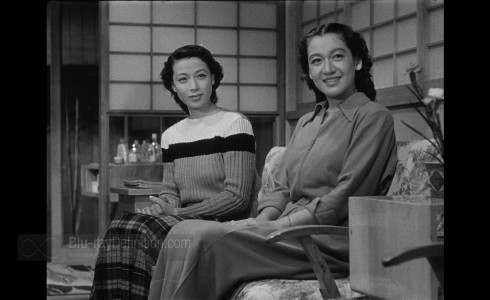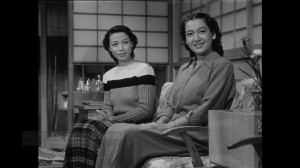Movie a Day Blog is doing an independent study these days on the famed Japanese director Yasujiro Ozu, whose films inspired filmmakers as diverse as Terrence Malick and Paul Schrader. We are going through select Ozu titles in chronological order, and it’s fascinating to see his visual and dramatic aesthetic evolve through different periods.
EARLY SUMMER (1951) is the second post-World War II Ozu movie I’ve watched, the fourth overall, and it is sublime. Ozu focuses primarily, but not exclusively, on the family unit, and the changes in Japanese society unfold as part of intimate domestic drama. In this film, Western influences that became dominant during the United States occupation of Japan are more prevalent, and Western homes, clothes and furnishings seem firmly established in this new Japan.
Ozu had a favorite actress, Setsuko Hara, who became a major Japanese movie star and was so devoted to Ozu that she stopped acting when he stopped directing.
In an earlier Ozu film, LATE SPRING (1949), Hara played a loyal daughter who was willing to forgo marriage and a fully adult life to stay with her scholarly father. He forces out of the nest, but when LATE SUMMER commences, she’s right back in the same predicament. She’s 28, and everyone in her family, especially her married older brother, wants to see her hitched.
By emphasizing the traditional aspects of Japanese life so movingly, Ozu could be considered old-fashioned, especially when compared to his colleague and critical rival, Akira Kurosawa, who often plunged headlong into new Japan in films such as HIGH AND LOW (1963).
Yet in EARLY SUMMER, Ozu presents Hara as a fiercely independent woman who doesn’t get married because she consciously chooses not to. And it’s not a question of failing to find or fall in love; she honestly states that doesn’t matter to her. This behavior would have been unheard of in pre-war Japan, and shows the differences made in the status of women since LATE SPRING, made just two years earlier.
Hara, her brother, his wife, their two children and their mother and father all share the same house at the beginning of the film, but not at the end, a further deterioration of the extended Japanese family unit that was an integral part of traditional culture, in which the obligation of the children is to house and support their parents.
By in effect driving Hara out of the house, the brother (played by another Ozu regular, Chisu Ryu, startling in this role because he played Hara’s father in LATE SPRING!) drives a wedge in the family, and even enlists Hara’s boss to come up with suitable suitors.
When Hara finally makes her decision, it is totally unexpected, and again demonstrates Ozu’s mastery in coming at a potentially cliched situation with an approach that proves fresh and appropriate for the character. Of course, once she has decided to wed, her family turns all disapproving, and do their best to scuttle her plans. But Hara has the most inner strength of any character in this Ozu film, and follows exactly the course she has determined for herself.
Even in the end, Ozu surprises us by skipping the wedding and new life for Hara, and instead returns to the now-rueful parents, living with the ancient uncle who turns up now and then, their family scattered, their son lost to the war (revealed through a heart-breaking radio program called The Missing Persons Hour).
Ozu’s next and perhaps greatest masterpiece, TOKYO STORY (1953), will follow the parents into yet another transformed Japan, this time in the bowels of its greatest city. But for now, EARLY SUMMER is more than sufficient: a moving yet unsentimental look into family life that is at once so foreign and so familiar.



Comments are closed